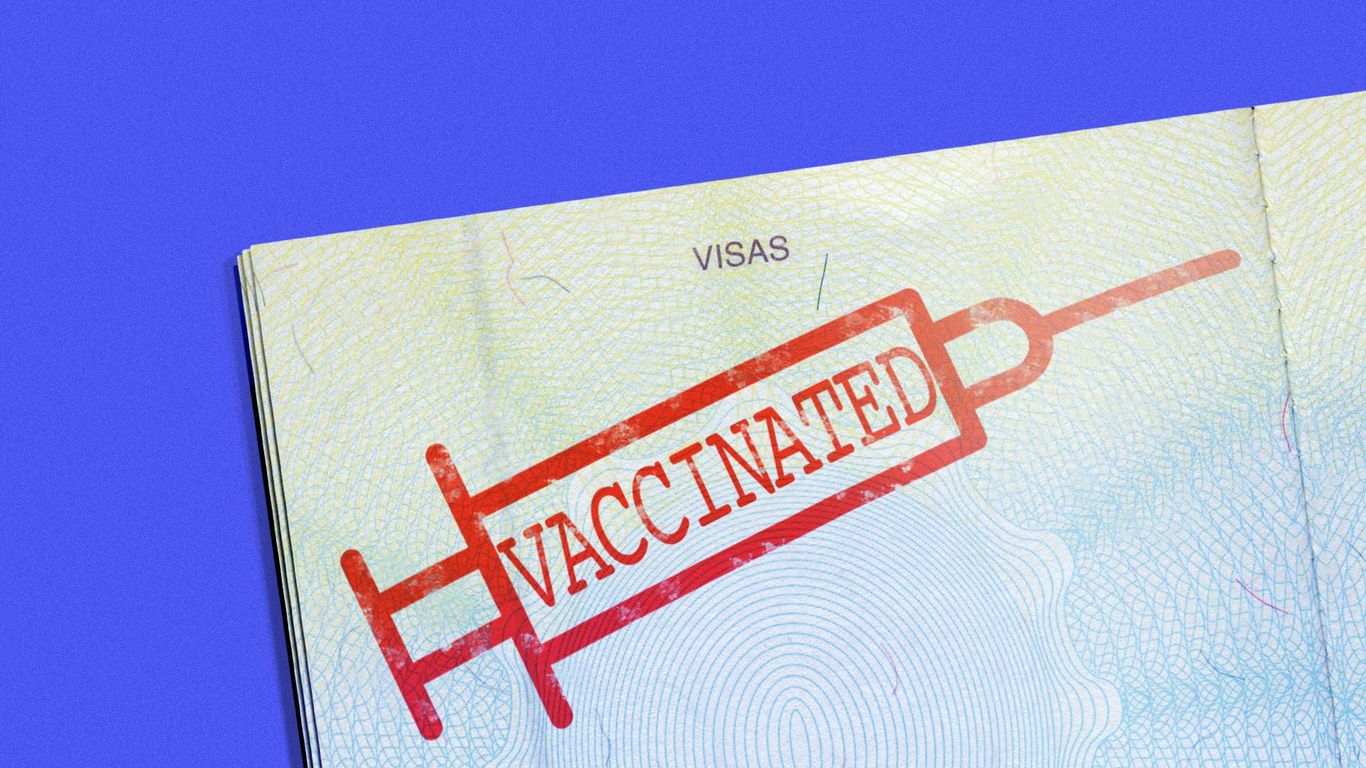
Vaccine passports may soon become available to help people get back to life but they face numerous scientific, social and political barriers to acceptance.
The big picture: Reliable and accessible evidence of vaccine-induced protection against the novel coronavirus could accelerate international travel and economic reopening, but the obstacles to widespread adoption are so great that it may never fully arrive.
Driving the news: The secure digital identity app CLEAR and CommonPass, a health app that gives users access to vaccination records and COVID-19 test results, will work together to provide a vaccine passport service, my Axios colleague Erica Pandey reports.
- The news comes as a growing number of countries and companies are discussing plans to introduce similar vaccine passports that could help the protected to return to normal life and travel as soon as possible.
- “To get the economy back on track, to save certain industries, I think you need a solution like that,” said Eric Piscini, a vice president at IBM who oversaw the development of the new health passport app. the company, to the New York Times.
Yes but: There are many health, ethical and operational questions that must be resolved before vaccine passports can become an effective part of everyday life.
Health: Medical experts are still not quite sure how effective vaccinations – or exposure to the virus – prevent further transmission of COVID-19.
- While the CDC will soon release new guidelines around social activity for fully vaccinated people, current recommendations still ask them to continue wearing masks and practicing social distance.
- Until it is clear that vaccination effectively prevents transmission, there is a limit to how useful a vaccine passport can be for public health – especially if emerging variants make some vaccines less protective.
- “The usefulness of a vaccine passport is only as good as proof of how long the immunity lasts,” David Salisbury, an associate at Chatham House think tank, told Bloomberg. “You could have a stamp in your passport that lasts longer than the antibodies in your blood.”
Ethical: The most obvious use of vaccine passports is for international travel, which is paralyzed by severe quarantine restrictions. But such a system runs the risk of excluding billions of people who cannot or will not receive the vaccine.
- The EU has discussed the introduction of a vaccine passport, with tourism-dependent countries such as Greece in charge. But Germany and France – where vaccine roll-out was low and hesitation high – have reservations, and such a system appears to be months away.
- Of greater ethical concern are the many people in developing countries who may be denied access to vaccines of any kind for months or even years, while wealthy countries hoard supplies.
- And if vaccine passports are used not only for international travel, but also to allow people to work domestically and participate in social life, they could create crippling disparate barriers that could paradoxically reinforce vaccine reluctance.
Operational: Passports for international travel are regulated by governments and have decades of history, but there is no such unified system for vaccine passports, which are put in place by governments and companies with different standards, making them a target for fraud.
- The US, in particular, has a decentralized medical system that can make it difficult for people to easily access their medical records, especially if they don’t have digital literacy.
- “I can almost 100% guarantee that fraud will occur,” said Jane Lee, a trust and security architect at cybersecurity firm Sift. “We will have a lot of bad actors pretending to provide a service that provides some sort of vaccination passport, but it is in fact a phishing campaign.”
Be smart: None of these obstacles are insurmountable in themselves. But as we’ve seen with the failures of digital contact tracking, the fact that a technology solution exists doesn’t mean it will be effective or be adopted by the public.
- “There is tremendous motivation to make this work socially,” said Kevin Trilli, chief product officer at Onfido, an identification verification company. “But there are a lot of government issues that will make the system really difficult to implement.”
- Again, there is time pressure, especially in the US, where vaccination coverage has increased. The more people vaccinated, the less value it will be to create a complex system to separate the protected from the unprotected.
It comes down to: Some form of vaccine visas will likely be introduced for international travel, but they seem unlikely to become a passport to resume normal life.